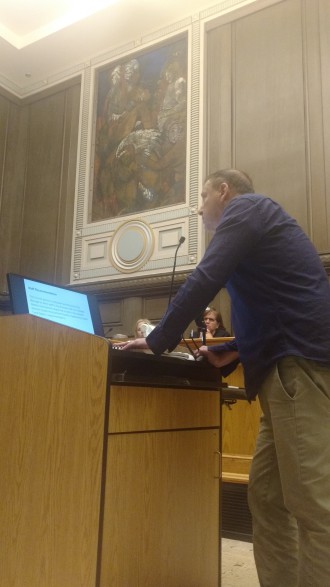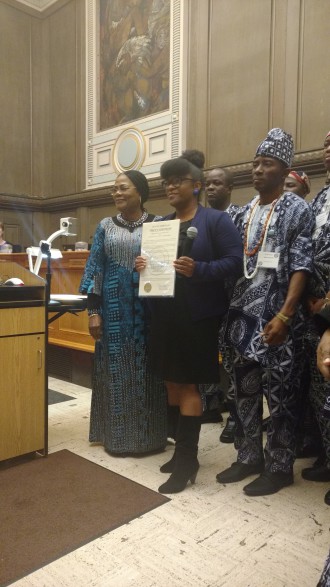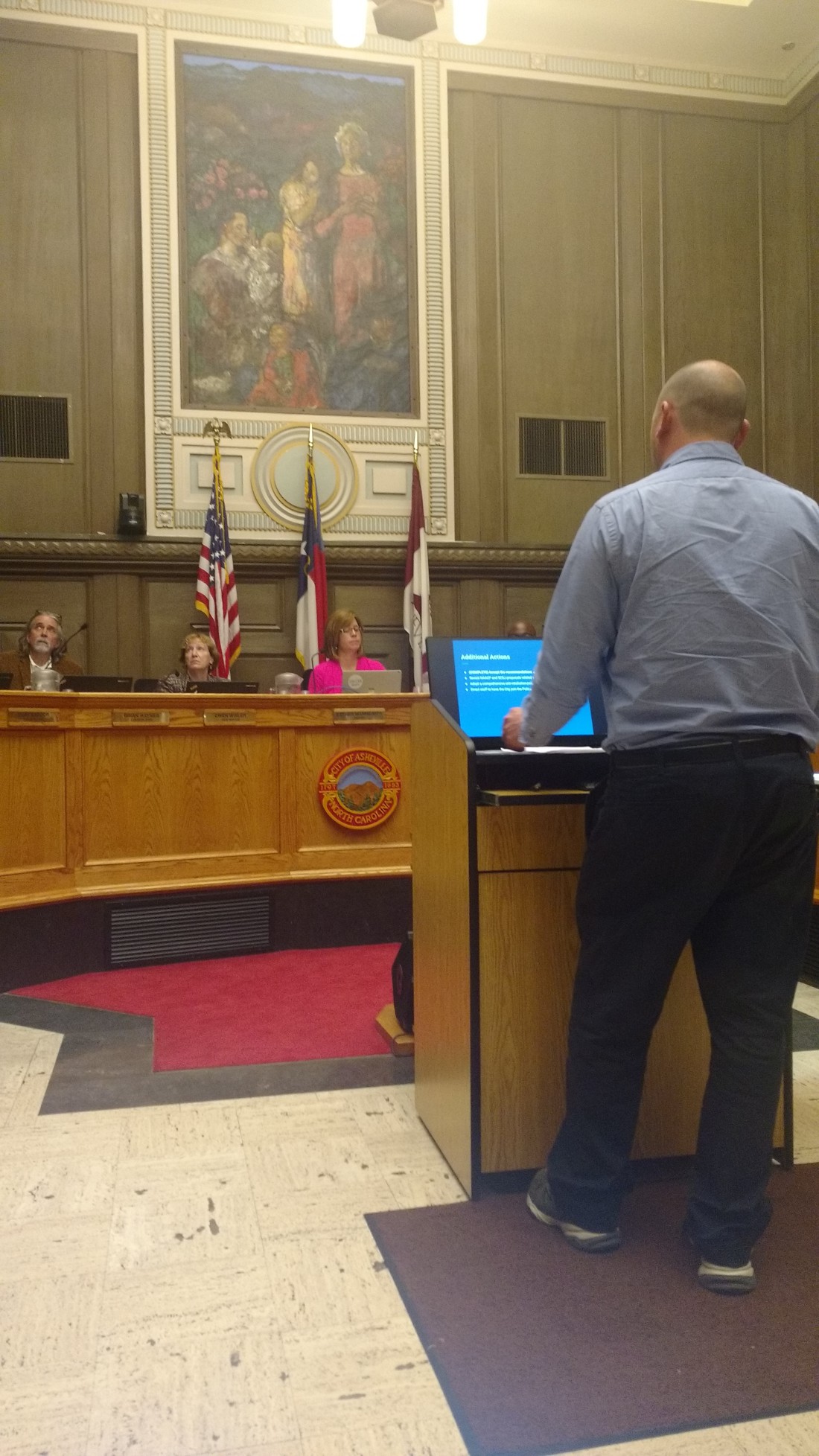“In the words of Bernie Mac, bust a move.” Asheville City Council member Keith Young summarized the sentiments of many in attendance at Council’s April 24 meeting as he encouraged interim City Manager Cathy Ball and other city staff to speed up their work on promoting data transparency for the Asheville Police Department.
Council considered the topic after a presentation by Patrick Conant, a volunteer with the nonprofit civic technology advocacy organization Code for Asheville. Conant shared the group’s Petition for Police Accountability Through Data Transparency, which requests the public release of police data, reports and policies to the city of Asheville website and open data portal.
The petition comes in response to widespread criticism of the APD after the leak of body camera footage showing former police officer Chris Hickman, who is white, beating black Asheville resident Johnnie Jermaine Rush after stopping him for alleged jaywalking. District Attorney Todd Williams has since charged Hickman with felony assault by strangulation and related offenses.
“This is how we start the important process of rebuilding trust with the community: by providing our residents with the information they need to participate in the process,” said Conant about the Code for Asheville petition. Although all of the information discussed in the petition is currently public record, he noted that the time and effort required to make a request can discourage citizens from seeking it out.
Conant said that the petition had widespread community support, pointing to over 700 signatures from residents and endorsements from groups such as the Asheville Youth Mission, Racial Justice Coalition and Sunlight Foundation. Carmen Ramos-Kennedy, president of the Asheville-Buncombe NAACP, and Brynn Estelle, operations director for Tranzmission, spoke in favor of the petition during the public comment period.
Although she supported the petition, recent City Council candidate and small-business owner Dee Williams expressed her frustration at Council’s approach for moving forward with other changes to policing. She claimed that Council’s Public Safety Committee has not sufficiently communicated with the NAACP as the city considers proposals developed by the organization’s Criminal Justice Reform Committee.
“The Council has saw it fit to reach over and get our white allies and left the NAACP totally out of the process,” Williams said. “We’ve had to remind folks that the tail does not wag the dog. It’s just disrespectful, and it’s called tokenism.”
Mayor Esther Manheimer thanked Conant and Code for Asheville for their suggestions, saying that Council agreed with the principles of transparency and data sharing. She noted that last year’s budget had included a directive for APD to produce quarterly reports on traffic stop data but that implementation had fallen short of the goal.
“We have been eager for some time to be able to see more data and have that reviewed on a really regular basis,” Manheimer said. “I don’t feel like that’s come to fruition in the way that we were hoping. My personal impression [is that] we would have more.”
Council member Julie Mayfield added her hope that city staff or community groups could go beyond simply making the data available. “I think it’s not generally very helpful when governments just throw out a bunch of information and there’s no interpretation or understanding of what the data says,” she explained. “It allows the data to be manipulated and used for good and bad on all sides.”
While Council took no immediate action on the petition, they directed Ball to begin looking at Code for Asheville’s requests and assemble a report with specific next steps and action items to present at Council’s May 15 meeting. Ball agreed to that timeline but noted that the complexity of the issue would take time to consider.
“I would reiterate that this is a collaborative effort between the Police Department and legal staff, as well as IT,” Ball said. “We are committed to transparency and providing information; we want to make sure that we protect the rights of all the individuals involved.”
Slowing the tempo
While the public encouraged Council to accelerate police data sharing, residents largely sought the opposite momentum in the discussion of the Charlotte Street Improvements process that followed. Multiple speakers hoped to reduce traffic speed on the busy north-south corridor and increase safety for pedestrians and bicyclists.
Community members were generally in favor of the city’s “road diet” option, which would convert Charlotte Street from four lanes to three lanes of vehicle traffic starting north of Chestnut Street. The plan would also add dedicated bike lanes, improved sidewalks and safer pedestrian street crossings. Although Transportation Department Director Ken Putnam said the final price tag for the changes is yet to be determined, the current budget assigns $1.25 million to the project through fiscal year 2019-20.
Mike Sule, executive director of Asheville on Bikes, was among those who addressed Council to support the road diet. Citing data on bicycle accidents in the city, he emphasized the cyclist community’s need for truly dedicated lanes, not just “sharrow” markings that indicate shared lanes for bikes and motorists. “If we’re interested in moving all people by a variety of modes, then we have to build robust infrastructure,” Sule said.
Clark Mackey, resident and co-owner of CAKE Websites and More, put a human face on the transportation issue — that of his young daughter, with whom he frequently rides in the Charlotte Street neighborhood and throughout North Asheville. He shared photos of the two making stops at Ultimate Ice Cream, Luella’s Bar-B-Que and Greenlife Grocery, saying that “if we want more of this, we’ve got to get out of the business of putting sharrows down and put down protected bike infrastructure.”

Yet not all of the speakers agreed with the road diet proposal. Resident Max Alexander recalled watching an ambulance struggle against traffic on Merrimon Avenue as he suggested that eliminating capacity for vehicles would cause problems for emergency services using the Charlotte Street corridor.
“Suppose there’s a fire on Sunset Drive, and the firetruck is delayed by five minutes because they have to go through at rush hour,” Alexander asked. “With a fire, for every one-minute delay, the damage doubles.” Notably, a city-funded transportation study from 2013 estimates that the road diet would generally decrease delays or leave them unchanged on Charlotte Street by 2035.
Former Vice Mayor Chris Peterson voiced broader opposition to bicycle infrastructure as part of nearly 10 minutes of comment, during which he also accused Manheimer and Council of turning Asheville into “a cheap tourist trap” and ignoring structural issues with the city’s budget.
“How many kids in Hillcrest can go out and buy $1,000 suits with bicycles?” Peterson remarked. “It’s an elitist sport. It’s the new golf courses for our millennial, socialist, Democrat party that tells you what to do, because you’re all members.”
In line with the weight of public opinion expressed at the meeting, however, Council moved forward with the road diet option for Charlotte Street. Mayfield proposed an amended version of the original resolution, which Council unanimously passed, that specifically focused on dedicated bike lanes. The amended version also maintains the area’s Asheville Innovation District designation, which offers an additional avenue for project funding. Formal planning is set to begin in September of this year.
In other business
Two city employees used their comment time to raise concerns about differences in pay levels between the Parks and Recreation Department and other areas of the city. Suzanne Stowe and Claude Gable, laborers with the department, claimed that other employees with their title have received at least $13 per hour since November but that their own wages have stayed well below that level.
“Do the powers that be simply believe that the people who clean and maintain the park facilities aren’t as important as every other Laborer I in the city?” Stowe asked. “I recognize that creating a budget for the city is not an easy task, but I do expect the city to respect its own policy of equity and fairness.” In response, Manheimer directed Ball to look into the pay discrepancy and bring the results to the Council’s finance committee.

Council also read five ceremonial proclamations for upcoming honorary dates. One especially colorful observance was Council member Sheneika Smith proclaiming April 24 Osogbo Day: A delegation of roughly 10 members from Asheville’s sister city, the capital of Osun state in Nigeria, received the certificate dressed in traditional patterns and headwear. Manheimer got a chuckle from the crowd when she introduced “water drinker” and Council member Gwen Wisler to proclaim May 6-12 as National Drinking Water Week.
Finally, Council passed its previously announced consent agenda, with the exception of a resolution and budget amendment to fund renovations on sports courts at several city parks. The agenda’s resolution to support federal action on carbon fee and dividend legislation received the most comment, with several members of the Asheville chapter of the Citizens’ Climate Lobby speaking in support.
Chris Gentile, executive director of the WNC Nature Center, also explained the rationale behind funding an exhibit and breeding facility for red pandas. An extinct ancestor of the central Asian mammal, the Bristol’s Panda, lived in the Southern Appalachians roughly 5 million years ago. “We will be able to show people a comparison between the current panda and the panda that used to live in this area,” he said.
However, Manheimer didn’t seem to need much convincing as she assented to the project. “Keith [Young] just pulled up a picture, and they are the cutest things in the whole world,” she said.
The next regular City Council meeting will take place on Tuesday, May 15 (rescheduled from May 8), at 5 p.m. in Council chambers on the second floor of City Hall at 70 Court Plaza, Asheville.
Editor’s note: This piece was updated on April 26 to clarify the intent of Dee Williams’s remarks.




My comments were directed to City Council, as I worked in support of the low cost/no cost proposal. Most recently, my writing in favor of it has been fashioned for candidates in the Voter Guide put forth by Democracy, N.C. Mr. Conant did not reach out to them, they reached out to him, and spoke against it. You misquoted me, as I began my commentary, that this had to do with ” process”. My comments were directed to Council, since they initiated contact.
Dee Williams
Hello Dee, I appreciate you reaching out. I believe that I have accurately quoted you; I transcribed your remarks from City Council’s official recording of the meeting on YouTube at https://youtu.be/4hDa6BtQsEI?t=7649.
Hello. You portrayed as if I disagreed with the low cost/ no cost methodology. That is not true, since I initiated the Committee. My remarks were directed to Council and you know it. I will see you next Council meeting to clarify, since I am the procuring cause of bringing this team together and have pushed to get this done. You stand corrected, sir, but I am used to being portrayed in this fashion until all the haters become my congratulators. I actually have work to do, so see you in real life. Another hater!
Post 2002 George W Bush’s The Patriot Act-
When the po po finally keep their body cams on (with audio!) when they clock in until
they clock out, then and only then will I post about how cops are your friends.
Until then, at least the military has rules of engagement.
Like don’t discharge a deadly weapon unless someone shoots at you first.
Yep. I said it out loud.